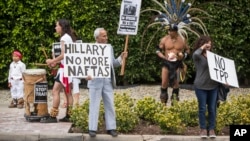U.S. Democratic presidential candidate Hillary Clinton said Wednesday that she did not support the new Trans-Pacific Partnership, a huge trade deal she advocated when she was secretary of state.
The United States, Japan and 10 other Pacific Rim nations completed years of negotiations and signed a deal Monday. But the TPP must be ratified by its member governments, and in the United States, that is the job of Congress, where a major fight and a close vote are predicted.
Clinton said the TPP would do too little to protect U.S. workers from the impact of currency manipulation by other nations, and too much to help major pharmaceutical companies at the expense of patients.
Senator Bernie Sanders of Vermont, who is also seeking the Democrats' presidential nomination for 2016, also has come out against the treaty, while Vice President Joe Biden, who some speculate may seek the nomination, supports the pact.
Democrats are generally supported by labor unions, which worry that the trade agreement will continue the sharp decline of manufacturing jobs in the United States.
Business and industry are usually allied with Republicans, and many members of that party support trade agreements, although some have not yet decided whether to support this particular, lengthy and complex deal.
President Barack Obama said the agreement would help American companies and workers by eliminating thousands of taxes on U.S. exports and cutting other barriers to trade. He said the TPP also included provisions to protect labor rights and set strong environmental standards.
Mexican President Enrique Pena Nieto called the TPP a "bold" agreement that would expand opportunity in Asia and Latin America for exporters in his nation.
Analysts at the Wells Fargo Economics Group said the immediate impact of the TPP would be limited in the United States because Washington already has free-trade agreements with many of these nations. But the analysts said this pact would cover about 40 percent of the world's economy, and that is encouraging more nations to try to join. Wells Fargo noted that talks were already underway with another five nations.
A separate analysis by the Fitch rating agency said it might take years for the impact of TPP to be felt, and it noted that some developing nations like Vietnam would see far more benefit than the United States.





